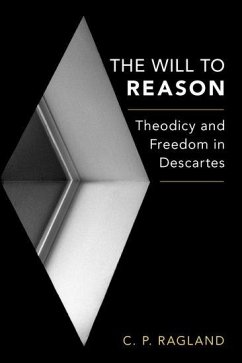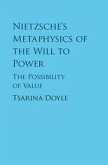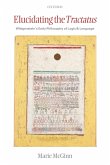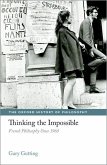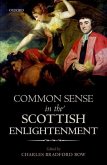- Gebundenes Buch
- Merkliste
- Auf die Merkliste
- Bewerten Bewerten
- Teilen
- Produkt teilen
- Produkterinnerung
- Produkterinnerung
Descartes' free will theodicy is crucial to his project of refuting skepticism and vindicating the consistency of Reason. The theodicy relies on a coherent understanding of human freedom as the ability to do the right thing, but such freedom appears to conflict with Descartes' account of Divine Providence.
Andere Kunden interessierten sich auch für
![The Blackwell Guide to Descartes' Meditations The Blackwell Guide to Descartes' Meditations]() GAUKROGER STEPHENThe Blackwell Guide to Descartes' Meditations58,99 €
GAUKROGER STEPHENThe Blackwell Guide to Descartes' Meditations58,99 €![Silencing the Demonas Advocate Silencing the Demonas Advocate]() Ronald RubinSilencing the Demonas Advocate81,99 €
Ronald RubinSilencing the Demonas Advocate81,99 €![Nietzsche's Metaphysics of the Will to Power Nietzsche's Metaphysics of the Will to Power]() Tsarina DoyleNietzsche's Metaphysics of the Will to Power127,99 €
Tsarina DoyleNietzsche's Metaphysics of the Will to Power127,99 €![Elucidating the Tractatus Elucidating the Tractatus]() Marie McGinnElucidating the Tractatus52,99 €
Marie McGinnElucidating the Tractatus52,99 €![The Oxford Handbook of Leibniz The Oxford Handbook of Leibniz]() The Oxford Handbook of Leibniz251,99 €
The Oxford Handbook of Leibniz251,99 €![Thinking the Impossible Thinking the Impossible]() Gary GuttingThinking the Impossible58,99 €
Gary GuttingThinking the Impossible58,99 €![Common Sense in the Scottish Enlightenment Common Sense in the Scottish Enlightenment]() Common Sense in the Scottish Enlightenment115,99 €
Common Sense in the Scottish Enlightenment115,99 €-
-
-
Descartes' free will theodicy is crucial to his project of refuting skepticism and vindicating the consistency of Reason. The theodicy relies on a coherent understanding of human freedom as the ability to do the right thing, but such freedom appears to conflict with Descartes' account of Divine Providence.
Hinweis: Dieser Artikel kann nur an eine deutsche Lieferadresse ausgeliefert werden.
Hinweis: Dieser Artikel kann nur an eine deutsche Lieferadresse ausgeliefert werden.
Produktdetails
- Produktdetails
- Verlag: Oxford University Press
- Seitenzahl: 272
- Erscheinungstermin: 1. April 2016
- Englisch
- Abmessung: 236mm x 157mm x 28mm
- Gewicht: 499g
- ISBN-13: 9780190264451
- ISBN-10: 0190264454
- Artikelnr.: 47864238
- Herstellerkennzeichnung
- Libri GmbH
- Europaallee 1
- 36244 Bad Hersfeld
- gpsr@libri.de
- Verlag: Oxford University Press
- Seitenzahl: 272
- Erscheinungstermin: 1. April 2016
- Englisch
- Abmessung: 236mm x 157mm x 28mm
- Gewicht: 499g
- ISBN-13: 9780190264451
- ISBN-10: 0190264454
- Artikelnr.: 47864238
- Herstellerkennzeichnung
- Libri GmbH
- Europaallee 1
- 36244 Bad Hersfeld
- gpsr@libri.de
C. P. Ragland is Associate Professor of Philosophy at Saint Louis University. There he especially enjoys introducing students to philosophy as well as teaching and doing research in the history of modern philosophy and philosophy of religion. With Sarah Heidt, he is co-editor of What is Philosophy (Yale UP, 2001).
Abbreviations
Introduction
Notes to Introduction
Chapter One: Descartes' Deepest Worry
I. The "Deceiving Nature " Doubt
II. The Circle and the Two-Level Solution
III. Descartes' Engagement with Skepticism
IV. Conclusion
Notes to Chapter One
Chapter Two: The Fourth Meditation Theodicy
I. The Problem of Error
II. Descartes' Theodicy
A. Unreality of Error
B. Descartes' General Strategy (and the Eternal Truths)
C. Skeptical Theism?
D. The Big Picture
E. Free Will
F. Possible Error: The Big Picture Returns
G. The Theodicy Summarized
III. Does It Prove Too Much?
IV. Is It Circular?
A. Ought Implies Can
B. Assuming the Truth-Rule for Defensive Purposes
V. Does It Rest on a Flawed View of Freedom?
Notes to Chapter Two
Chapter Three: Freedom and Alternative Possibilities in the Meditations
I. The Definition Of Freedom
A. Retraction, Expansion, or Clarification?
B. Against Retraction
C. Expansion or Clarification?
II. Texts that Seem to Favor the Expansion Reading
A. The Explanatory Passage
B. The Great Light Passage
III. Pro-Clarification: The Infinite Will and the Image of God
A. Differences Between Divine And Human Freedom
B. The Analogy Between Divine And Human Freedom
C. Similarities and Differences: Signs Of An Implicit Distinction
IV. Conclusion
Notes to Chapter Three
Chapter Four: The Gibieuf Connection And The Later Descartes
I. The Gibieuf Connection
A. Background: Descartes and Gibieuf
B. Agreement About Freedom And Indifference
C. Explicit Agreement On Human Freedom?
D. Implicit Agreement On Human Freedom
E. What Agreement With Gibieuf Shows
II. Descartes' Later Texts On Freedom
A. Principles Of Philosophy (1644)
B. 1644 Letter To Mesland
C. The 1645 Letter to Mesland
Notes to Chapter Four
Chapter Five:
I. The Radical Libertarian Interpretation and the Meaning of CDD
II. Attention and The Moderate Libertarian View
III. The Compatibilist Reading
IV. Conclusion
Notes to Chapter Five
Chapter Six: Is Descartes' View Of Freedom Coherent?
I. Degrees Of Freedom: Preliminaries
A. An Initial Puzzle
B. Motivation and Degrees Of Freedom: Other Philosophers
C. Motivation and Degrees Of Freedom: Descartes
II. The 1645 Letter in Detail
A. The Meaning of "Elicited "
B. Spontaneity: Inversely Proportional to Indifference
C. Spontaneity: Absolute and Relative
D. Spontaneity and Perversity: Kenny's Objection
E. Why Kenny's Objection Fails
III. Final Worries
Notes to Chapter Six
Chapter Seven: Freedom and Divine Providence
I. Introduction: The Problem of Providence and Freedom
II. Concurrence And Providence: Scholastic Background
A. Aquinas' Picture
B. The Jesuit and Dominican Variations on Concurrence
C. Competing Theories of Providence
III. Descartes' Non-Causal View Of Providence
A. Against Supernatural Compatibilism
B. Correspondence with Elizabeth: Molinist Leanings
C. Three Objections to the Molinist Interpretation Refuted
IV. Providence and The Eternal Truths: A Hybrid View
A. My Interpretation Defended
B. Why Descartes Would Not Share My Worries
Notes to Chapter Seven
Conclusion: The Creation Doctrine Strikes Again
Bibliography
Introduction
Notes to Introduction
Chapter One: Descartes' Deepest Worry
I. The "Deceiving Nature " Doubt
II. The Circle and the Two-Level Solution
III. Descartes' Engagement with Skepticism
IV. Conclusion
Notes to Chapter One
Chapter Two: The Fourth Meditation Theodicy
I. The Problem of Error
II. Descartes' Theodicy
A. Unreality of Error
B. Descartes' General Strategy (and the Eternal Truths)
C. Skeptical Theism?
D. The Big Picture
E. Free Will
F. Possible Error: The Big Picture Returns
G. The Theodicy Summarized
III. Does It Prove Too Much?
IV. Is It Circular?
A. Ought Implies Can
B. Assuming the Truth-Rule for Defensive Purposes
V. Does It Rest on a Flawed View of Freedom?
Notes to Chapter Two
Chapter Three: Freedom and Alternative Possibilities in the Meditations
I. The Definition Of Freedom
A. Retraction, Expansion, or Clarification?
B. Against Retraction
C. Expansion or Clarification?
II. Texts that Seem to Favor the Expansion Reading
A. The Explanatory Passage
B. The Great Light Passage
III. Pro-Clarification: The Infinite Will and the Image of God
A. Differences Between Divine And Human Freedom
B. The Analogy Between Divine And Human Freedom
C. Similarities and Differences: Signs Of An Implicit Distinction
IV. Conclusion
Notes to Chapter Three
Chapter Four: The Gibieuf Connection And The Later Descartes
I. The Gibieuf Connection
A. Background: Descartes and Gibieuf
B. Agreement About Freedom And Indifference
C. Explicit Agreement On Human Freedom?
D. Implicit Agreement On Human Freedom
E. What Agreement With Gibieuf Shows
II. Descartes' Later Texts On Freedom
A. Principles Of Philosophy (1644)
B. 1644 Letter To Mesland
C. The 1645 Letter to Mesland
Notes to Chapter Four
Chapter Five:
I. The Radical Libertarian Interpretation and the Meaning of CDD
II. Attention and The Moderate Libertarian View
III. The Compatibilist Reading
IV. Conclusion
Notes to Chapter Five
Chapter Six: Is Descartes' View Of Freedom Coherent?
I. Degrees Of Freedom: Preliminaries
A. An Initial Puzzle
B. Motivation and Degrees Of Freedom: Other Philosophers
C. Motivation and Degrees Of Freedom: Descartes
II. The 1645 Letter in Detail
A. The Meaning of "Elicited "
B. Spontaneity: Inversely Proportional to Indifference
C. Spontaneity: Absolute and Relative
D. Spontaneity and Perversity: Kenny's Objection
E. Why Kenny's Objection Fails
III. Final Worries
Notes to Chapter Six
Chapter Seven: Freedom and Divine Providence
I. Introduction: The Problem of Providence and Freedom
II. Concurrence And Providence: Scholastic Background
A. Aquinas' Picture
B. The Jesuit and Dominican Variations on Concurrence
C. Competing Theories of Providence
III. Descartes' Non-Causal View Of Providence
A. Against Supernatural Compatibilism
B. Correspondence with Elizabeth: Molinist Leanings
C. Three Objections to the Molinist Interpretation Refuted
IV. Providence and The Eternal Truths: A Hybrid View
A. My Interpretation Defended
B. Why Descartes Would Not Share My Worries
Notes to Chapter Seven
Conclusion: The Creation Doctrine Strikes Again
Bibliography
Abbreviations
Introduction
Notes to Introduction
Chapter One: Descartes' Deepest Worry
I. The "Deceiving Nature " Doubt
II. The Circle and the Two-Level Solution
III. Descartes' Engagement with Skepticism
IV. Conclusion
Notes to Chapter One
Chapter Two: The Fourth Meditation Theodicy
I. The Problem of Error
II. Descartes' Theodicy
A. Unreality of Error
B. Descartes' General Strategy (and the Eternal Truths)
C. Skeptical Theism?
D. The Big Picture
E. Free Will
F. Possible Error: The Big Picture Returns
G. The Theodicy Summarized
III. Does It Prove Too Much?
IV. Is It Circular?
A. Ought Implies Can
B. Assuming the Truth-Rule for Defensive Purposes
V. Does It Rest on a Flawed View of Freedom?
Notes to Chapter Two
Chapter Three: Freedom and Alternative Possibilities in the Meditations
I. The Definition Of Freedom
A. Retraction, Expansion, or Clarification?
B. Against Retraction
C. Expansion or Clarification?
II. Texts that Seem to Favor the Expansion Reading
A. The Explanatory Passage
B. The Great Light Passage
III. Pro-Clarification: The Infinite Will and the Image of God
A. Differences Between Divine And Human Freedom
B. The Analogy Between Divine And Human Freedom
C. Similarities and Differences: Signs Of An Implicit Distinction
IV. Conclusion
Notes to Chapter Three
Chapter Four: The Gibieuf Connection And The Later Descartes
I. The Gibieuf Connection
A. Background: Descartes and Gibieuf
B. Agreement About Freedom And Indifference
C. Explicit Agreement On Human Freedom?
D. Implicit Agreement On Human Freedom
E. What Agreement With Gibieuf Shows
II. Descartes' Later Texts On Freedom
A. Principles Of Philosophy (1644)
B. 1644 Letter To Mesland
C. The 1645 Letter to Mesland
Notes to Chapter Four
Chapter Five:
I. The Radical Libertarian Interpretation and the Meaning of CDD
II. Attention and The Moderate Libertarian View
III. The Compatibilist Reading
IV. Conclusion
Notes to Chapter Five
Chapter Six: Is Descartes' View Of Freedom Coherent?
I. Degrees Of Freedom: Preliminaries
A. An Initial Puzzle
B. Motivation and Degrees Of Freedom: Other Philosophers
C. Motivation and Degrees Of Freedom: Descartes
II. The 1645 Letter in Detail
A. The Meaning of "Elicited "
B. Spontaneity: Inversely Proportional to Indifference
C. Spontaneity: Absolute and Relative
D. Spontaneity and Perversity: Kenny's Objection
E. Why Kenny's Objection Fails
III. Final Worries
Notes to Chapter Six
Chapter Seven: Freedom and Divine Providence
I. Introduction: The Problem of Providence and Freedom
II. Concurrence And Providence: Scholastic Background
A. Aquinas' Picture
B. The Jesuit and Dominican Variations on Concurrence
C. Competing Theories of Providence
III. Descartes' Non-Causal View Of Providence
A. Against Supernatural Compatibilism
B. Correspondence with Elizabeth: Molinist Leanings
C. Three Objections to the Molinist Interpretation Refuted
IV. Providence and The Eternal Truths: A Hybrid View
A. My Interpretation Defended
B. Why Descartes Would Not Share My Worries
Notes to Chapter Seven
Conclusion: The Creation Doctrine Strikes Again
Bibliography
Introduction
Notes to Introduction
Chapter One: Descartes' Deepest Worry
I. The "Deceiving Nature " Doubt
II. The Circle and the Two-Level Solution
III. Descartes' Engagement with Skepticism
IV. Conclusion
Notes to Chapter One
Chapter Two: The Fourth Meditation Theodicy
I. The Problem of Error
II. Descartes' Theodicy
A. Unreality of Error
B. Descartes' General Strategy (and the Eternal Truths)
C. Skeptical Theism?
D. The Big Picture
E. Free Will
F. Possible Error: The Big Picture Returns
G. The Theodicy Summarized
III. Does It Prove Too Much?
IV. Is It Circular?
A. Ought Implies Can
B. Assuming the Truth-Rule for Defensive Purposes
V. Does It Rest on a Flawed View of Freedom?
Notes to Chapter Two
Chapter Three: Freedom and Alternative Possibilities in the Meditations
I. The Definition Of Freedom
A. Retraction, Expansion, or Clarification?
B. Against Retraction
C. Expansion or Clarification?
II. Texts that Seem to Favor the Expansion Reading
A. The Explanatory Passage
B. The Great Light Passage
III. Pro-Clarification: The Infinite Will and the Image of God
A. Differences Between Divine And Human Freedom
B. The Analogy Between Divine And Human Freedom
C. Similarities and Differences: Signs Of An Implicit Distinction
IV. Conclusion
Notes to Chapter Three
Chapter Four: The Gibieuf Connection And The Later Descartes
I. The Gibieuf Connection
A. Background: Descartes and Gibieuf
B. Agreement About Freedom And Indifference
C. Explicit Agreement On Human Freedom?
D. Implicit Agreement On Human Freedom
E. What Agreement With Gibieuf Shows
II. Descartes' Later Texts On Freedom
A. Principles Of Philosophy (1644)
B. 1644 Letter To Mesland
C. The 1645 Letter to Mesland
Notes to Chapter Four
Chapter Five:
I. The Radical Libertarian Interpretation and the Meaning of CDD
II. Attention and The Moderate Libertarian View
III. The Compatibilist Reading
IV. Conclusion
Notes to Chapter Five
Chapter Six: Is Descartes' View Of Freedom Coherent?
I. Degrees Of Freedom: Preliminaries
A. An Initial Puzzle
B. Motivation and Degrees Of Freedom: Other Philosophers
C. Motivation and Degrees Of Freedom: Descartes
II. The 1645 Letter in Detail
A. The Meaning of "Elicited "
B. Spontaneity: Inversely Proportional to Indifference
C. Spontaneity: Absolute and Relative
D. Spontaneity and Perversity: Kenny's Objection
E. Why Kenny's Objection Fails
III. Final Worries
Notes to Chapter Six
Chapter Seven: Freedom and Divine Providence
I. Introduction: The Problem of Providence and Freedom
II. Concurrence And Providence: Scholastic Background
A. Aquinas' Picture
B. The Jesuit and Dominican Variations on Concurrence
C. Competing Theories of Providence
III. Descartes' Non-Causal View Of Providence
A. Against Supernatural Compatibilism
B. Correspondence with Elizabeth: Molinist Leanings
C. Three Objections to the Molinist Interpretation Refuted
IV. Providence and The Eternal Truths: A Hybrid View
A. My Interpretation Defended
B. Why Descartes Would Not Share My Worries
Notes to Chapter Seven
Conclusion: The Creation Doctrine Strikes Again
Bibliography

